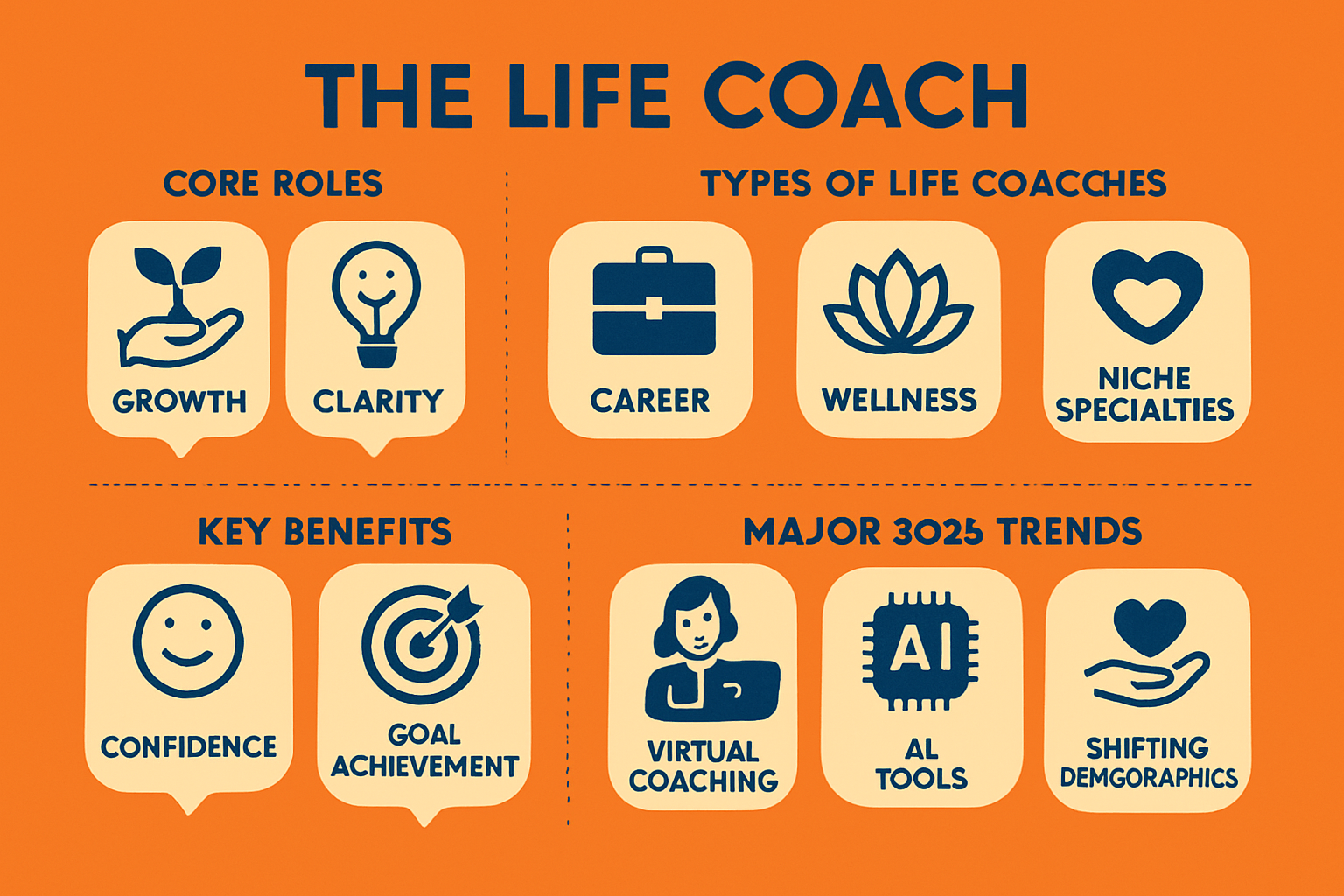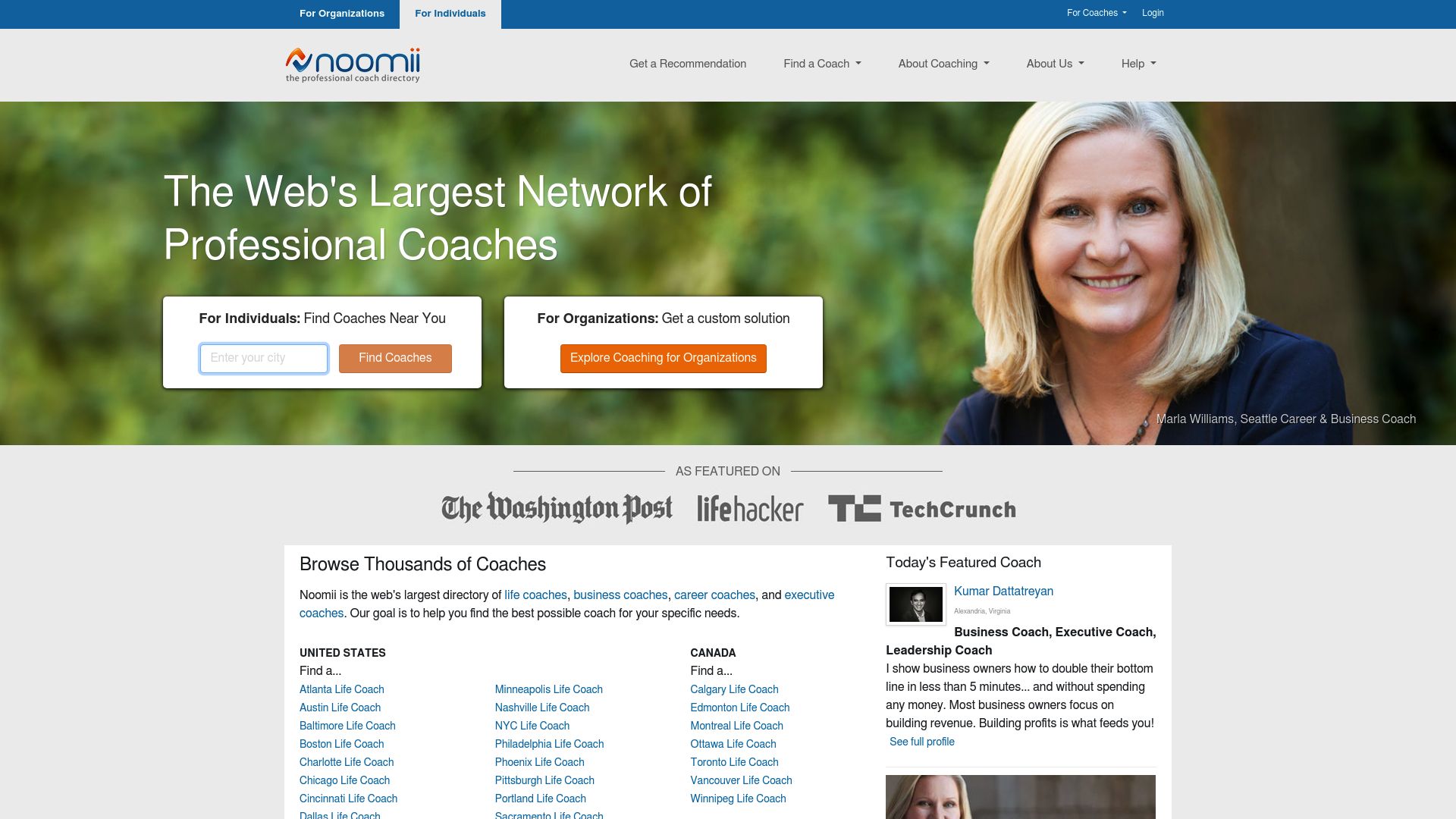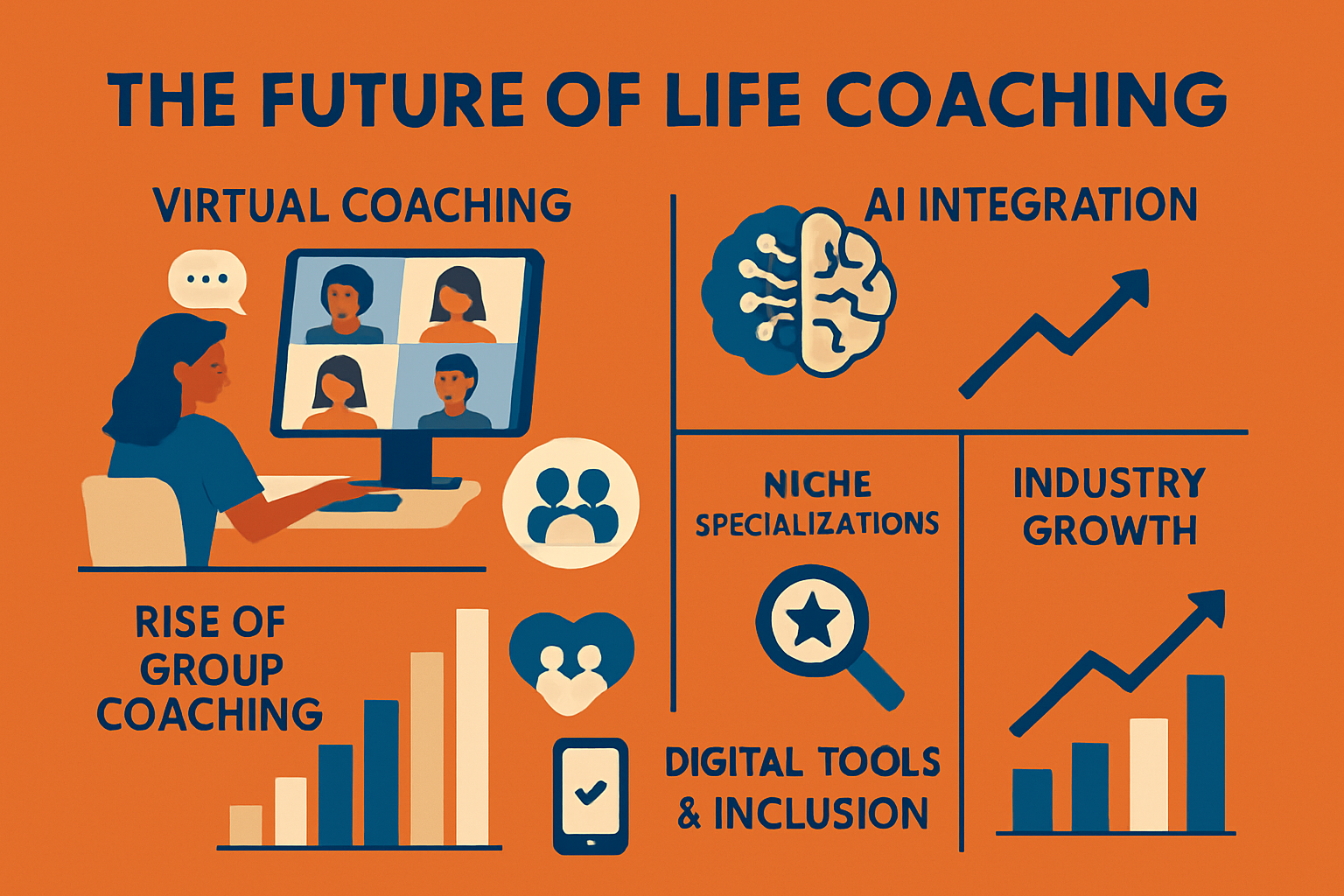Posted on August 18, 2025 by Don Markland
2025 is set to be a defining year for personal growth, with life coaching gaining more visibility and acceptance than ever before. Around the world, individuals are turning to coaches to gain clarity, break through obstacles, and realize their full potential. A life coach empowers clients to see new possibilities and create lasting change where it matters most. This guide will walk you through what life coaching is, highlight the latest trends, help you find the right coach, explain the coaching process, and offer a look ahead at what the future holds.What Is a Life Coach? Understanding the Role and Value
Life coaching has rapidly become a trusted pathway for transformation and fulfillment. But what exactly does a life coach do, and why are so many people turning to these professionals for support in 2025? Let’s break down the role, value, and future of life coaching for today’s world.
Defining Life Coaching
A life coach is distinct from a therapist or consultant. While therapy often explores past trauma and consulting offers direct advice, life coaching focuses on facilitating personal growth and helping clients set and achieve future goals. The International Coach Federation (ICF) defines life coaching as partnering with clients in a thought-provoking, creative process that inspires them to maximize their potential. Many still believe a life coach simply tells clients what to do, but true coaching is about empowering individuals to find their own answers. For example, a life coach life coach recently guided a client through a major career transition—not by giving orders, but by asking the right questions and encouraging self-discovery.Types of Life Coaches and Specializations
There are many types of life coach professionals, each offering unique expertise. Popular niches include career, executive, wellness, relationship, and business coaching. In recent years, there’s been a surge in demand for specialized coaching, such as for ADHD, expats, and digital nomads. Specialization shapes a coach’s style and the outcomes clients experience. For instance, a relationship coach helped a client rebuild trust after a difficult breakup, leading to a happier, more fulfilling partnership. According to the 2023 ICF Global Coaching Study, more coaches are niching down to meet specific needs. For more on why specialization matters, check out these Niche Specialization Trends.The Benefits of Working with a Life Coach
Working with a life coach brings a range of benefits. Clients often report greater self-awareness, increased confidence, and improved goal-setting skills. Accountability is another key draw, as coaches provide structure and encouragement throughout the journey. Many people also experience better work-life balance and reduced stress. Surveys show that client satisfaction rates are high, with most reporting positive returns on their investment in coaching. One client shared how their life coach helped them break through self-doubt, leading to a long-awaited promotion and a renewed sense of purpose.The Evolution of Life Coaching in 2025
The life coach landscape is evolving rapidly in 2025. Virtual coaching sessions, AI-powered tools, and group programs are becoming the norm. The industry’s market value is projected to keep rising as more people seek guidance in a changing world. Remote work and digital transformation have made coaching more accessible, with online platforms connecting clients and coaches worldwide. Client demographics are also shifting, as younger generations and diverse backgrounds increasingly turn to life coaching for support and growth.How to Choose the Right Life Coach for You
Choosing the right life coach is a personal and empowering journey. With so many options available, it’s essential to follow a structured process to ensure the best fit for your unique needs and goals.Assessing Your Goals and Readiness
Before working with a life coach, take time to clarify what you want to achieve. Are you hoping to advance your career, find balance, or improve relationships? Reflect on whether coaching is the best fit compared to therapy or mentoring. Use simple self-assessment tools like a goal-setting worksheet. Write down your top objectives, current challenges, and readiness for change. This process ensures you approach your search for a life coach with clear intentions, making it easier to find someone who truly aligns with your needs.Credentials, Certifications, and Experience
When evaluating a potential life coach life coach, check for reputable credentials. The International Coach Federation (ICF) is the gold standard, but other recognized certifications matter too. Experience in your area of interest—like career, wellness, or relationships—adds value. Be on the lookout for red flags such as lack of formal training, vague promises, or limited client testimonials. According to the ICF 2023 study, a majority of coaches now hold formal credentials, reflecting the industry’s growing professionalism. Always verify a life coach’s background before making your choice.Interviewing and Vetting Potential Coaches
A discovery call is your chance to interview a life coach and see if your personalities and styles mesh. Prepare key questions such as:- What is your coaching philosophy?
- How do you measure client progress?
- Can you share success stories in my area of interest?
Understanding Pricing and Packages
Life coach services are offered through various pricing models: hourly rates, packages, and retainers. Average costs can vary by region and specialty. For example, executive coaching may be priced higher than wellness coaching. Factors that influence pricing include the coach’s experience, niche, and delivery format (in-person or virtual). Ask for a detailed breakdown of what’s included in a package—number of sessions, support between meetings, and any digital resources. Understanding these details will help you choose a life coach who fits your budget and expectations.Find a Life Coach Online: The Role of Coaching Directories
Online directories like Noomii make it easier to find a life coach who matches your goals. These platforms let you filter coaches by specialization, credentials, and location, saving time and effort. Noomii’s SmartMatch™ algorithm connects clients to coaches with relevant expertise and verified backgrounds. For clients, this means more choice and confidence; for coaches, increased visibility and opportunities. Many users report positive experiences and successful outcomes thanks to the streamlined process provided by these directories.
Noomii’s SmartMatch™ algorithm connects clients to coaches with relevant expertise and verified backgrounds. For clients, this means more choice and confidence; for coaches, increased visibility and opportunities. Many users report positive experiences and successful outcomes thanks to the streamlined process provided by these directories.
The Life Coaching Process: What to Expect Step-by-Step
Embarking on a journey with a life coach is a transformative experience. Understanding each stage helps you approach coaching with confidence and clarity. Here’s a step-by-step look at what you can expect as you partner with a life coach to unlock your full potential.Step 1: Initial Consultation and Goal Setting
Your partnership with a life coach begins with an initial consultation. This first session is all about building rapport, clarifying what you want to achieve, and determining if you and your coach are a good fit. Together, you’ll explore your aspirations and challenges. The coach may use an intake questionnaire to guide the discussion and help uncover underlying motivations. A key outcome is collaboratively setting SMART goals—specific, measurable, achievable, relevant, and time-bound. For example, you might set a goal to transition careers within six months, or to improve work-life balance. This foundation creates a clear path forward with your life coach life coach, ensuring you’re aligned from the start.Step 2: Creating a Personalized Action Plan
With your goals defined, your life coach will help you break them down into actionable steps. This stage is highly personalized and may include vision boards, progress trackers, or digital planning apps to keep you organized and motivated. You’ll work together to design a weekly or monthly action plan. Here’s a sample template you might use:| Week | Action Step | Resources Needed | Progress Notes |
|------|-----------------------|------------------|-------------------|
| 1 | Update resume | Resume template | Draft completed |
| 2 | Apply to 3 positions | Job boards | Applied to 2 |
Step 3: Ongoing Sessions and Accountability
The heart of the life coach process is ongoing support. Sessions are typically held weekly or bi-weekly, lasting 45 to 60 minutes. During these check-ins, you’ll review progress, celebrate wins, and tackle any obstacles that arise. Accountability plays a central role. Your coach may introduce tools like accountability partnerships or digital trackers to keep you engaged. As virtual coaching becomes more common, many coaches now use online platforms for seamless communication and progress monitoring. According to Virtual Coaching Adoption Statistics, more clients are benefiting from flexible, tech-enabled coaching than ever before. Your life coach adjusts strategies in response to your feedback, making each session dynamic and responsive.Step 4: Measuring Progress and Celebrating Wins
Progress is measured using clear metrics that you and your life coach life coach defined in the first stage. This could include reaching a career milestone, improving relationships, or adopting healthier habits. Celebrating achievements, big or small, builds momentum and confidence. For instance, a client might reach a long-term savings goal or successfully launch a new project with their coach’s support. According to ICF’s 2023 data, clients who work with a life coach report higher goal achievement rates and increased satisfaction. Recognizing these wins makes your journey more rewarding and motivating.Step 5: Transitioning and Sustaining Growth
As you near your goals, your life coach will help you prepare for life after coaching. This transition phase focuses on maintaining momentum and independence. You’ll develop strategies for self-reflection and ongoing growth. Some coaches offer alumni groups or periodic check-ins to support continued progress. Knowing when to return for more coaching is also important. If new challenges arise, your life coach can help you navigate the next stage. The goal is to empower you to sustain transformation long after formal sessions end.Common Coaching Tools and Frameworks
Life coach professionals use a variety of tools and frameworks to facilitate growth:- GROW Model: Guides conversations from Goal to Reality, Options, and Will.
- Wheel of Life: Visualizes life balance across key areas.
- Strengths Assessments: Uncovers your core talents.
- Digital Tools: Apps, video calls, and digital journals make coaching accessible and efficient.
| Tool/Framework | Purpose | Format |
|---|---|---|
| GROW Model | Structured goal setting | Conversation |
| Wheel of Life | Visual life assessment | Worksheet/App |
| Accountability Apps | Track actions and progress | Mobile/Web |
The Future of Life Coaching: Trends and Predictions for 2025 and Beyond
As we look ahead, the future of life coach is more dynamic and innovative than ever. New technologies, shifting client needs, and evolving industry standards are shaping a landscape filled with opportunity and transformation. Let’s explore the trends and predictions that will define life coaching in 2025 and beyond.
Technology’s Impact on Coaching Delivery
Technology is revolutionizing life coach delivery. AI-powered coaching assistants are now supporting clients between sessions, providing reminders, feedback, and personalized learning paths. Virtual reality is emerging as a tool for immersive visualization and practice scenarios, making sessions more interactive. AI chatbots can help clients reflect and track progress, while platforms streamline scheduling and communication. According to AI Integration in Coaching, digital coaching tools are projected to see rapid adoption in 2025, enhancing both the coach and client experience. These advances mean greater flexibility and support for clients, whether they’re at home or on the go.Expanding Access and Inclusion
Life coach is becoming more accessible than ever. Group coaching models are growing, offering affordable options and a sense of community. Coaches are intentionally reaching underrepresented and marginalized groups, fostering diversity and equity in personal development. Community-based coaching initiatives are meeting people where they are, both online and offline. Demographic data shows a rise in younger clients and more men seeking coaching, expanding the traditional client base. This shift reflects a broader movement: making personal growth and coaching support available to all who seek it.New Specializations and Emerging Niches
The life coach landscape is diversifying with exciting new niches. Coaches are specializing in areas like neurodiversity, digital wellness, and eco-anxiety, responding to evolving societal needs. Digital wellness coaches, for example, guide clients in managing online habits and reducing tech-related stress. A table of top emerging niches for 2025:| Niche | Focus Area |
|---|---|
| Digital Wellness | Healthy tech use |
| Neurodiversity | ADHD, autism support |
| Eco-Anxiety | Climate change resilience |
| Expat Coaching | Global transitions |
| Mindful Leadership | Conscious business growth |
Regulatory Changes and Professional Standards
As the industry matures, regulations and standards for life coach are evolving. The ICF is updating credentialing requirements in 2025, emphasizing ethics, client safety, and ongoing education. Some countries are considering formal licensing, aiming to boost public trust and professionalism. These changes mean clients can expect higher standards and more transparency when choosing a coach. For coaches, staying informed and certified will be crucial for credibility. Ultimately, these developments strengthen the reputation and value of life coaching for everyone involved.The Business of Coaching: Opportunities and Challenges
The business side of life coach is booming, but not without challenges. Market growth projections show rising demand, but also increased competition. Coaches are differentiating themselves through personal branding, specialized services, and innovative delivery methods. Key opportunities:- Developing a strong niche
- Leveraging digital marketing
- Building online communities
The Evolving Client-Coach Relationship
The relationship between client and life coach is shifting toward partnership and co-creation. Clients now expect empowerment, autonomy, and collaboration, rather than top-down advice. Peer coaching and self-coaching resources are gaining popularity, giving clients more tools for independent growth. Collaborative models encourage open dialogue, goal-setting, and shared accountability. This evolution reflects a deeper trend: clients and coaches working together as equals, unlocking greater transformation and lasting change. The future promises a more inclusive, innovative, and client-centered coaching experience.Becoming a Life Coach: Qualifications, Training, and Career Pathways
Starting the journey to become a life coach is both inspiring and demanding. Whether you dream of guiding others toward their goals or want to create a fulfilling career, understanding what it takes is essential. Let’s break down the skills, education, business strategies, and realities of this profession.Essential Skills and Qualities of a Successful Life Coach
To succeed as a life coach, you need more than just enthusiasm. Core competencies include active listening, empathy, and powerful questioning. These skills help you build trust and foster transformation in your clients. Self-awareness is crucial. Great coaches commit to ongoing personal growth, regularly reflecting on their values and biases. Emotional intelligence is a game-changer, as it enables you to connect deeply, adapt your approach, and handle sensitive conversations with care. According to a 2024 survey, top-rated coaches consistently demonstrate adaptability, communication, and resilience. For example, a coach who leverages emotional intelligence can help clients navigate setbacks and stay motivated. These qualities set the foundation for a thriving life coach career.Education, Certification, and Training Options
Becoming a certified life coach usually starts with choosing the right training program. The International Coach Federation (ICF) sets the gold standard, offering accredited programs that emphasize ethics and core coaching competencies. You can pursue training online or in person. Online programs offer flexibility and accessibility, while in-person courses provide immersive experiences and networking opportunities. Here’s a quick comparison:| Training Type | Pros | Cons |
|---|---|---|
| Online | Flexible, accessible | Less face-to-face contact |
| In-person | Networking, immersive | Less flexible, travel |
